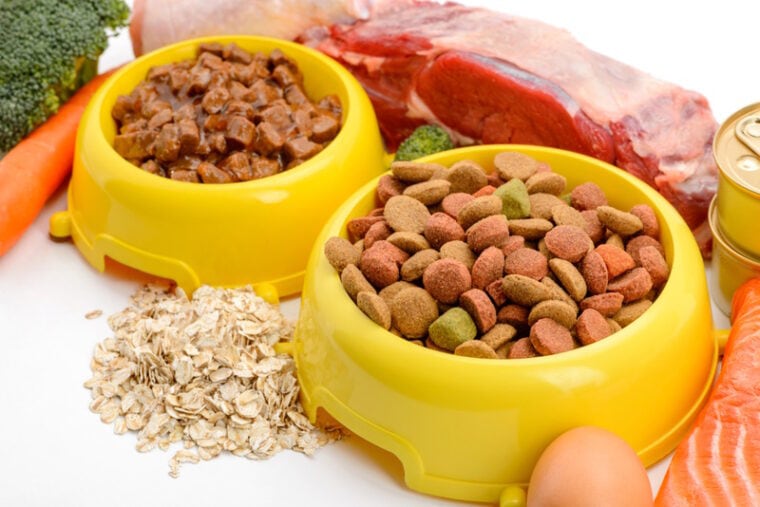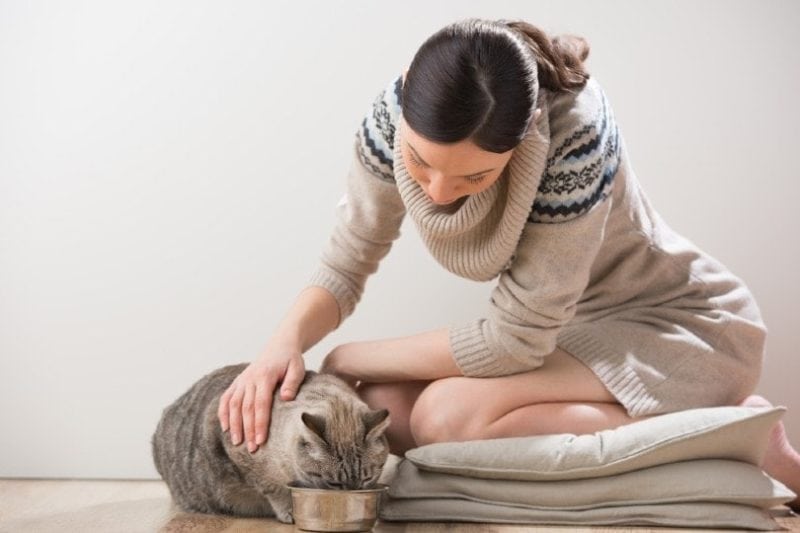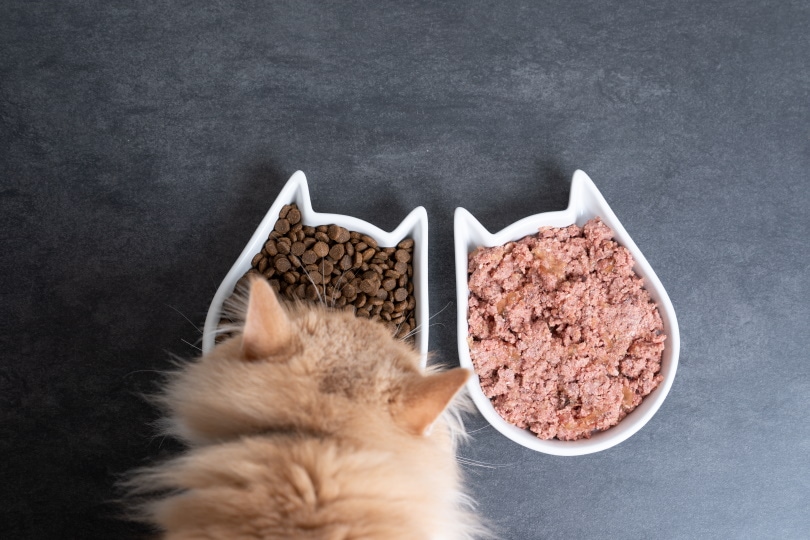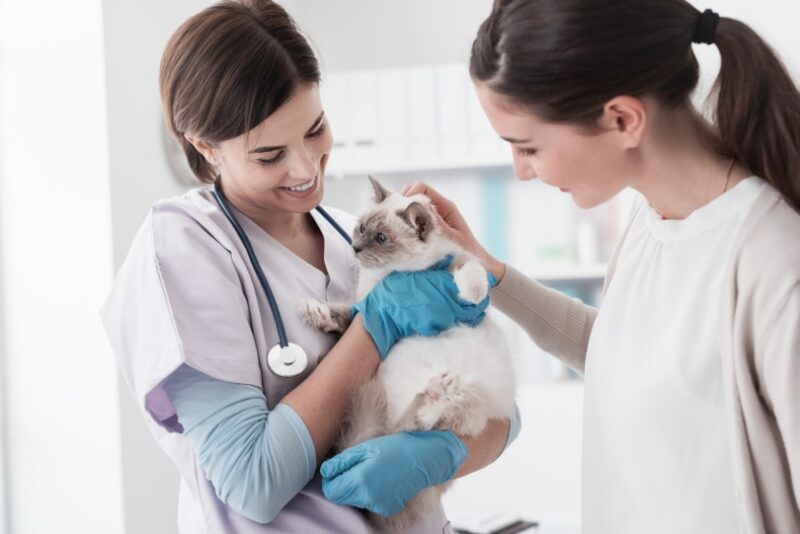
Click to Skip Ahead
We all want the best for our pets, and giving them a good diet is one of the ways we can keep them happy and healthy. Homemade diets versus storebought are a common discussion topic, and it can be challenging to navigate when you’re considering making the change.
When considering which food is better, you need to consider how to ensure your cat gets the precise nutrition they need. Cats need certain nutrients (such as taurine) to keep them healthy, and the amounts required are very precise 1. Therefore, storebought cat food is better for most pet owners (as long as it’s high-quality). Nutritional adequacy standards set by the Association of American Feed Officials (AAFCO) must be met or exceeded for a storebought pet food to be marketed as complete and balanced for a certain life stage.
What Is Homemade Cat Food?
Homemade cat food is any diet the owner prepares at home, either with raw or cooked ingredients. Homemade diets can vary dramatically in ingredients, cost, and time to make, so you need help to get the correct information you need when searching for a recipe. Many conflicting opinions exist about which homemade meals are best for cats, particularly regarding cooked vs. raw feeding. Let’s take a quick look below at the two varieties:

Cooked Homemade Diets
A cooked homemade diet for a cat involves proteins such as chicken or beef being cooked in various ways. Cooking usually makes the proteins and vegetation easier to digest, which is particularly important for cats as they have a digestive system not designed to eat raw vegetables. However, cooking reduces the nutrient content of most food, which is why some pet owners prefer raw food.
Raw Homemade Diets
Raw homemade diets for cats can either be a mix of meat and vegetables or a piece of meat with added vitamins and minerals given as-is (bones and all). The idea behind raw feeding is that it’s a cat’s natural diet that they’d eat in the wild.
Cats are obligate carnivores that must eat meat to survive, but the meat used in raw diets prepared at home is often not nutritionally similar to a wild cat diet. For example, a cat that kills and eats a mouse in the wild will gain the nutrition from what the mouse was eating too. Raw meat we buy for ourselves is often dangerous to eat raw due to the number of pathogens (such as Salmonella, E.coli and Campylobacter), so it must be cooked thoroughly to kill them.
How Is Homemade Cat Food Different From Store Bought?
Homemade cat food is different than storebought because it’s prepared fresh at home by the owners, and its nutrient profile is not tested. A storebought diet must undergo rigorous testing before it can be made commercially available, ensuring it’s suitable for cats.
Storebought food can contain preservatives and last a while in storage. Homemade diets are freshly prepared and can only be stored for a limited time in a refrigerator before going bad.

The Pros and Cons of Homemade and Storebought Diets
Now that we’ve discussed the differences between homemade and storebought feline diets and looked at some reasons people may want to feed each, we can compare the pros and cons of each. Every pet owner and every cat is different, so there’s no one-size-fits-all answer when asking, “Which is best?” However, by comparing the two, you’ll see how each might benefit your cat and the risks of feeding each type.
Homemade Cat Diet
Store Bought Cat Diet
Why Is a Correct Diet So Important for Cats?
Feeding your cat a suitable diet is incredibly important. Cats are obligate carnivores and must eat meat to survive. Meat contains essential amino acids such as taurine that cats cannot get from anywhere else or make themselves. Taurine is critical for the normal function of many of their bodily systems.
Taurine is essential in the function of a cat’s heart, eyes, digestion, immune system, and reproductive system. Without taurine, cats can develop dilated cardiomyopathy due to the weakening of the heart muscle, and they can lose their vision thanks to feline taurine retinopathy and the loss of the retinal cells in the eyes.
Arachidonic acid is a fatty acid found in animal fat sources that cats need to get from their diet. It has an important role in fat utilisation and energy production.
These are far from the only essential nutrients. Cats need balanced levels of protein, fat, carbohydrates, vitamins, and minerals to survive, which can be tricky with a homemade diet.

What Do Cats Need in Their Diet?
Protein is a vital part of a cat’s diet, and their bodies break it down into amino acids that act as building blocks that help their bodies function. As mentioned above, cats can only get some amino acids, such as taurine and arginine, from animal proteins. Here are the essential amino acids that should be included in a cat’s diet:
A storebought diet should contain at least 26% protein, as set out by the AAFCO, on a dry matter basis. However, the more protein a brand has is almost always better for the cat unless in specific circumstances where a protein-controlled diet is needed, such as cats with kidney disease.
Fat in your cat’s diet provides them with energy, as well as fatty acids such as omega 3, which keep their joints, skin, and coats healthy. Fat usually comes from the meat part of a cat’s diet, but it can also be added as oils, such as fish oil.

Cats don’t need many carbohydrates in their diet; they’ve evolved to get almost all their energy from protein and fat. Ideally less than 10% of a cat’s energy should be taken from carbohydrates, so a storebought formula low in carbohydrates is better for them than a high-carb brand.
Some vitamins and minerals are essential to cats to keep their bodies functioning correctly. The AAFCO guidelines state that all ‘complete and balanced’ storebought cat diets should contain certain amounts of the following vitamins & minerals:
How Can I Feed My Cat a Homemade Diet Safely?
If you want to feed your cat a homemade diet, you’ll have to do so carefully. Homemade diets are hard to get right because it’s difficult to balance the recipe with the essential nutrients. However, it can be done if you speak to a veterinary nutritionist and ask them for help creating a recipe and diet plan for your cat. Regular vet visits are also recommended during this time, and transitions should be made slowly from storebought to homemade food.

Final Thoughts
A homemade diet can suit some cats, but storebought diets are better most of the time. Storebought cat foods labelled with the AAFCO statement of nutritional adequacy, ensures the diet contains minimum amounts of protein, fat, vitamins, and minerals to help your cat thrive. Balancing a homemade diet can be difficult, but it’s possible with the help of a veterinary nutritionist. Raw homemade diets are riskier than cooked ones since raw meat contains dangerous food-borne pathogens such as campylobacter. The best way to change your cat’s diet is to consult your veterinarian before you begin.
Also see:
Featured Image Credit: Yuriy Golub, Shutterstock







